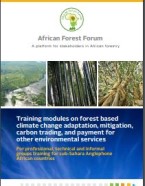Capacity building in forestry in all its forms is a central work area for the African Forest Forum (AFF). It was on this basis that AFF organized a workshop on capacity building and skills development in forestbased climate change adaptation and mitigation in Nairobi, Kenya on November 12-16, 2012, that drew 54 participants from selected academic, research and civil society institutions, as well as from the private sector and youth. The participants came from 22 countries, namely Benin, Botswana, Burkina Faso, Burundi, Cameroon, Côte dIvoire, Ethiopia, Gabon, Zambia, Ghana, Kenya, Malawi, Mali, Namibia, Niger, Nigeria, Senegal, Sudan, Tanzania, Togo, Uganda and Zimbabwe. It was also attended by staff from FAO and ICRAF.
The workshop identified the training needs on addressing the relationship between forests and climate change for educational and related forestry based training institutions at professional and technical levels, as well as for informal groups that are mainly made up of civil society organizations and local communities. Training needs and modules to guide training were developed based on agro-ecological regions of Sub-Sahara Africa. These are arid and semi-arid regions, including Sahelian belt; the savannas and woodlands of West, Eastern and Southern Africa; and the rainforests of West and Central Africa. Separate analyses were done for Anglophone and Lusophone countries as a block, and for Francophone countries as another block, given the different educational systems in these two language blocks. These training modules therefore fill the gaps observed by the training institutions.
In order to carry this work forward AFF organized, in 2013, four subregional workshops to first improve on the needs and contents of the modules as well as validating the same. The workshops also served as avenues to better orient/ retool staff from academic, research, extension and civil society organizations in key areas of science and practice of climate change as it relates to forests, and basing such training on these modules. A total of 111 people from academia, research, public sector, private sector, youth and civil society in Sub-Sahara Africa have been involved in the development and validation of the needs and the training modules.
In 2013, AFF conducted country training using the modules in Ethiopia, Niger and Zambia; more countries will be covered in the near future. AFF first developed the teaching materials that will later be developed into specific compendiums. It would appear that there are no other institutions that are preparing such teaching materials for forestry training in Sub-Sahara Africa and on the same scope. AFF seeks to use, to the extent possible, XIV Training modules on forest based climate change adaptation, mitigation, carbon trading, and payment for other environmental services the capacity in the continent to develop local solutions to forestry problems; and teaching materials is one area where AFF will continue to engage the expertise on the continent to develop them. We welcome interested individuals and institutions to make full and free use of these training modules in their work.

